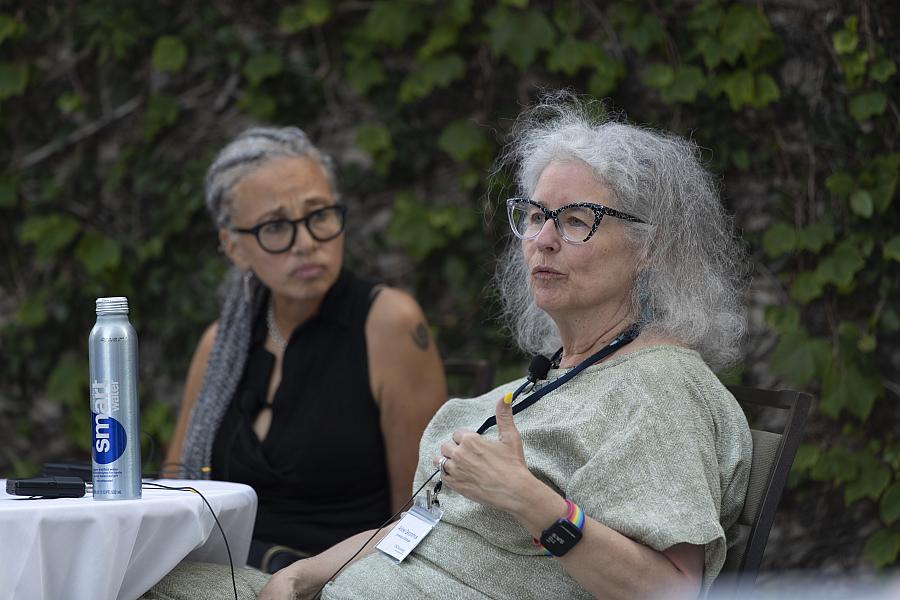How stress and injustice undermine health

Linda Villarosa and Arline Geronimus explain the concept of “weathering” at the Center for Health Journalism 2023 National Fellowship in Los Angeles.
Some forty years ago, University of Michigan scholar Arline T. Geronimus was in college assisting a professor doing research on teenage pregnancy. The professor believed, as many then insisted, that teenage childbearing was a major cause of intergenerational poverty and other social ills. In short, the professor held that individuals were responsible for their circumstances. The problem was simple: People were having babies too young.
Geronimus questioned this assertion. For one thing, data indicated that infant and maternal mortality among African Americans increased with the age of the mother — rather than decreased, as it did among white mothers. She also had first-hand experience: Geronimus was working part-time at a school for pregnant teenagers and found “there was a total disconnect” between the prevailing “expert” view of expectant Black teens and their own views and lived experience.
“What I saw was, first of all, they had real problems that weren’t their pregnancy,” Geronimus said in a keynote conversation with award-winning New York Times Magazine writer Linda Villarosa at the USC Center for Health Journalism 2023 National Fellowship in Los Angeles. Center Director Michelle Levander moderated the discussion.
“I saw pregnant teens who are having their babies in a high-poverty, segregated, disinvested area of a city in New Jersey,” Geronimus said.
Geronimus became friends with teens who were excited about parenthood. She visited them in their homes and apartments, which were often overcrowded, infested with insects, unheated in winter and without air conditioning in the swelter of summer. She also accompanied them to medical exams, where they were often mistreated by physicians. Geronimus said doctors would speak to her, a white woman, with more respect than they showed their patients, and be more forthcoming with information the teens needed to know.
These circumstances shed light on the data that first stood out to her in defining her central idea of “weathering” — that the longer Black pregnant women are subjected to stressors such as unhealthy and unsafe living conditions, and neglect, dismissal or abuse by society, the greater the threats to their maternal health. Geronimus went on to devote her career to investigating these stressors at the biological level and their impact on the people who experience them — and not only Black women. For example, she studied Latinx families contending with the enormous stress of a mass roundup by agents of the U.S. Immigration and Customs Enforcement in 2008 in Postville, Iowa. “Infants born to Latina mothers had a 24% greater risk of low birth weight after the raid when compared with the same period one year earlier,” her study found.
Geronimus, a professor of health behavior and health education at the University of Michigan School of Public Health, explores the topic in her new book, “Weathering: The Extraordinary Stress of Ordinary Life in an Unjust Society.” In her talk, Geronimus explained that weathering is “a human physiological process that over time erodes the health of people who are subject to racism, to classism and other forms of denigration.” Continual exposure to structurally racist stressors — social, psychological and environmental — harm health.
By choosing the term weathering, Geronimus also wanted to express the idea of people being able to withstand or overcome their hardships and life stressors. It is a contronym in this sense: “weathered by the elements, by things outside of you and outside of your control, but also you come through and endure through hardship. And the sources of weathering are both those.”
Journalist Linda Villarosa came across this work on weathering in 2017 while reporting on a story of maternal health and health inequity among Black women. She found the concept illuminating. Years of research had linked poor health outcomes and high death rates among Black women to poverty and education levels. But during her reporting, she was surprised by data showing that highly educated, middle-class Black women were more likely to die than a white woman without a high school education. She promptly reached out to Geronimus to understand why.
Earlier in Villarosa’s career, she was a health writer for Essence and later served as its executive editor. As the editor of a lifestyle magazine aimed at Black women, her job, she says, was “to tell people how to live better and how to take care of themselves, with the assumption that if everybody just does that, then the whole health outcome of the country, and especially Black Americans will change.” She credits Geronimus with helping her view maternal health and community well-being through a different lens, focused on institutional and structural racism.
Since their first chat, they have pushed back on the idea of personal responsibility as a cure-all and highlighted weathering.
Villarosa, director of the journalism program at City College of New York, has done in-depth coverage of the Black maternal health crisis and shared her experience witnessing and researching how differently Black pregnant women are treated than their white counterparts in medical settings, regardless of income or education. She is the author of the 2022 book, “Under the Skin: The Hidden Toll of Racism on Health in America,” a finalist for the Pulitzer Prize in general non-fiction.
She told the fellows to “never make assumptions.” She also emphasized how important it was for her to acknowledge the mistaken assumptions she once made about Black women’s health. “Those early years when I was at Essence, telling people, ‘Oh, if you just do this, everything will be perfect!’” The first chapter of her book is called “Everything I Thought Was Wrong.”
Villarosa closed the evening’s talk with this: “It takes a certain amount of humbleness and humility to say, ‘I messed up. I don’t believe that anymore.’ I changed, listened. I kept my mind open. I learned.”

